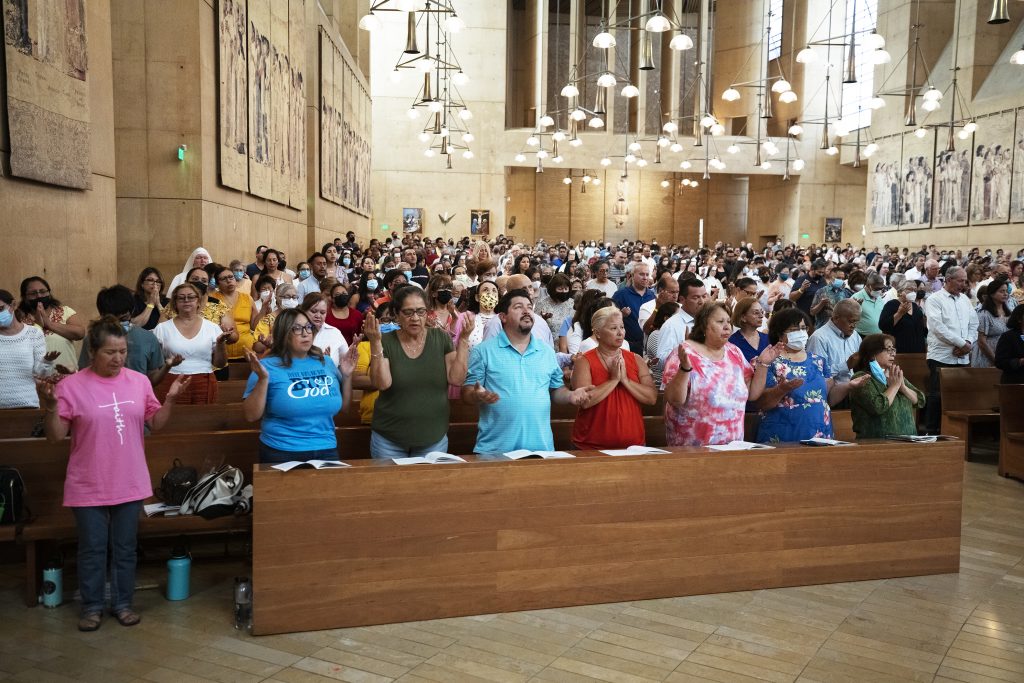(On Aug. 13, some 3,000 people gathered at the Cathedral of Our Lady of the Angels for a daylong Eucharistic Congress. The following is adapted from Archbishop Gomez’s remarks and homily. We will have full coverage of the congress in our next issue of Angelus.)
One of our newest saints is St. Charles de Foucauld. He has one of the great conversion stories in the 20th century, like the prodigal son.
The turning point in his life was going to Nazareth to live and pray as a hermit and to imitate the “hidden life” of Jesus.
In one letter he wrote: “I am in the house of Nazareth with Mary and Joseph, like a younger brother sitting opposite my elder brother Jesus, who is here night and day in the Sacred Host.”
I love that passage. There is such a beautiful intimacy, such a beautiful sense of friendship in those words.
The point is this: Jesus wants to have that same beautiful and intimate personal relationship with each and every one of us in the holy Eucharist.
Since the beginning, God has wanted to be in communion with the men and women he created.
He spoke to Adam and Eve in the first garden, in the cool of the evening. He spoke to Moses in the burning bush, and led his people out of Egypt, going before them as a pillar of fire. He spoke to the prophets, and through the prophets. And finally he has spoken to us, in his word made flesh.
You and I are a part of this great mystery, this beautiful history of salvation. The Letter to Hebrews tells us: “We are surrounded by so great a cloud of witnesses.”
This is true. If we could lift the veil, we would realize that we are in the company of angels and saints, that they are everywhere, all around us; if we had ears to hear, we would hear the songs of heaven.
The truth is that as we walk the paths of our ordinary daily lives, we go in the presence of the living God, and in the presence of this great cloud of witnesses.
The Eucharist opens our eyes to see this reality, it gives us our worldview as Catholics.
At the altar in every Mass, heaven and earth meet! Heaven is opened and the earth is lifted up, as we offer the gifts of creation to our Creator.
At that moment in every Mass, you and I are also offering our own hearts, our own lives. We are praying with the angels, singing their song with them: “Holy, Holy, Holy, Lord God of hosts!”
This is the ordinary miracle that we experience in every Mass. Our Creator comes to meet us, he comes to feed us with the bread of life, to nourish us on our pilgrimage through this world.
We should be living every day with eucharistic wonder.
In giving us the Eucharist, Jesus gives us a vision for seeing the world and our place in it. And in giving us the Eucharist, Jesus gives our lives a mission.
Every celebration of the Eucharist ends with a commission: Go forth, the Mass is ended! Go and announce the Gospel! Go, and glorify God by your life!
What begins within the church walls is meant to continue outside those walls. The gift that we receive at the holy table, we are called to share with our neighbors.
Jesus promised that he would be truly present in the bread and wine of the Eucharist. But he also promised that he would be present in the flesh and blood of our neighbors, especially the poor and the suffering. “As you did it to one of the least of these my brethren, you did it to me,” he told us.
The vision that Jesus gives us in the Eucharist calls us to serve our neighbors as we would him.
Jesus used to say to his disciples, “Come and see!” Let’s make that same invitation to people:
Come again, and see the miracle of the Mass! Come again, and see how much Jesus loves you!
Jesus is here now, with us, as truly present as when he was walking with his apostles in Galilee.
Let us give our lives to him, as he gave his life for us. And as he changes bread and wine into his body and blood, let us allow him to change our hearts, to make us a new creation in the fire of his love!
May holy Mary, in whose womb Our Lord took flesh, awaken in all of us — a new wonder at the mystery of his love in the holy Eucharist.

